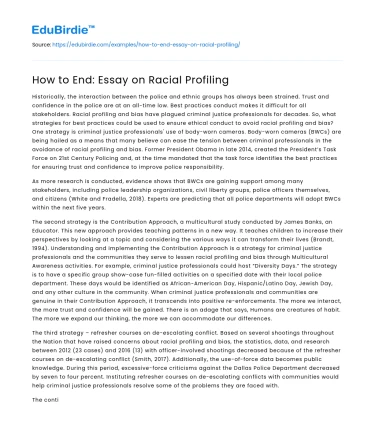Historically, the interaction between the police and ethnic groups has always been strained. Trust and confidence in the police are at an all-time low. Best practices conduct makes it difficult for all stakeholders. Racial profiling and bias have plagued criminal justice professionals for decades. So, what strategies for best practices could be used to ensure ethical conduct to avoid racial profiling and bias? One strategy is criminal justice professionals' use of body-worn cameras. Body-worn cameras (BWCs) are being hailed as a means that many believe can ease the tension between criminal professionals in the avoidance of racial profiling and bias. Former President Obama in late 2014, created the President’s Task Force on 21st Century Policing and, at the time mandated that the task force identifies the best practices for ensuring trust and confidence to improve police responsibility.
As more research is conducted, evidence shows that BWCs are gaining support among many stakeholders, including police leadership organizations, civil liberty groups, police officers themselves, and citizens (White and Fradella, 2018). Experts are predicting that all police departments will adopt BWCs within the next five years.
Save your time!
We can take care of your essay
- Proper editing and formatting
- Free revision, title page, and bibliography
- Flexible prices and money-back guarantee
The second strategy is the Contribution Approach, a multicultural study conducted by James Banks, an Educator. This new approach provides teaching patterns in a new way. It teaches children to increase their perspectives by looking at a topic and considering the various ways it can transform their lives (Brandt, 1994). Understanding and implementing the Contribution Approach is a strategy for criminal justice professionals and the communities they serve to lessen racial profiling and bias through Multicultural Awareness activities. For example, criminal justice professionals could host “Diversity Days.” The strategy is to have a specific group show-case fun-filled activities on a specified date with their local police department. These days would be identified as African-American Day, Hispanic/Latino Day, Jewish Day, and any other culture in the community. When criminal justice professionals and communities are genuine in their Contribution Approach, it transcends into positive re-enforcements. The more we interact, the more trust and confidence will be gained. There is an adage that says, Humans are creatures of habit. The more we expand our thinking, the more we can accommodate our differences.
The third strategy – refresher courses on de-escalating conflict. Based on several shootings throughout the Nation that have raised concerns about racial profiling and bias, the statistics, data, and research between 2012 (23 cases) and 2016 (13) with officer-involved shootings decreased because of the refresher courses on de-escalating conflict (Smith, 2017). Additionally, the use-of-force data becomes public knowledge. During this period, excessive-force criticisms against the Dallas Police Department decreased by seven to four percent. Instituting refresher courses on de-escalating conflicts with communities would help criminal justice professionals resolve some of the problems they are faced with.
The continuous refresher training would educate police officers on the Bill of Rights of citizens and how to treat the public fairly and easily through role-playing. The training should consist of how to talk and negotiate with individual situations to prevent violence. It is unlikely that each case will be the same. In volatile situations, emotions are high; there might be hidden agendas with the police as well as the presented situation. Instituting refresher courses on de-escalating conflict among criminal justice professionals could be a strategy that will deflate confronting conflicts.






 Stuck on your essay?
Stuck on your essay?

